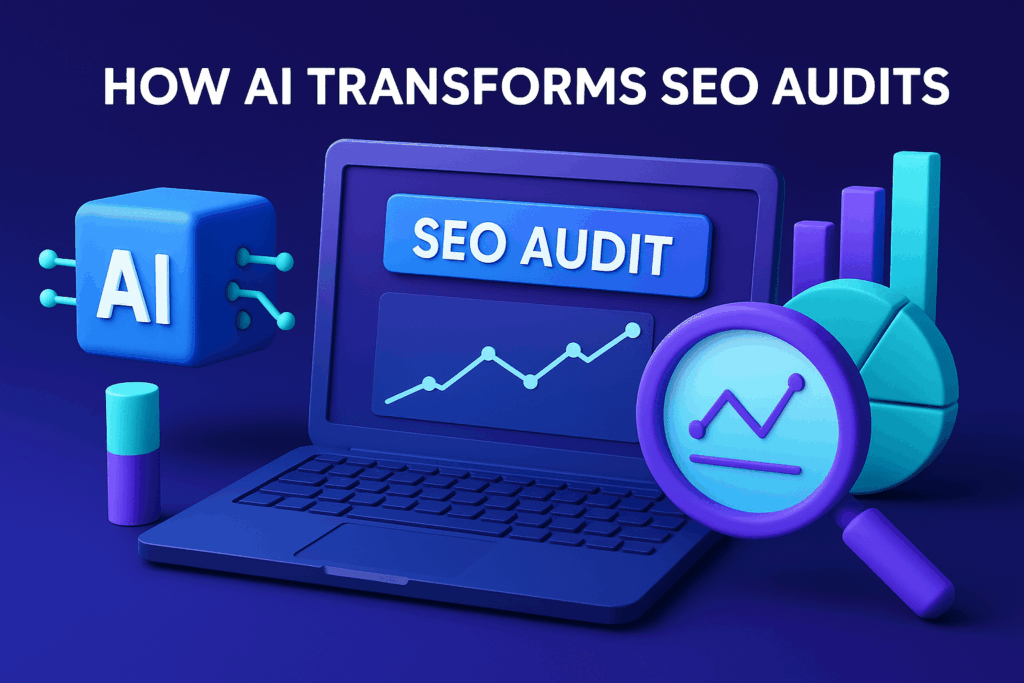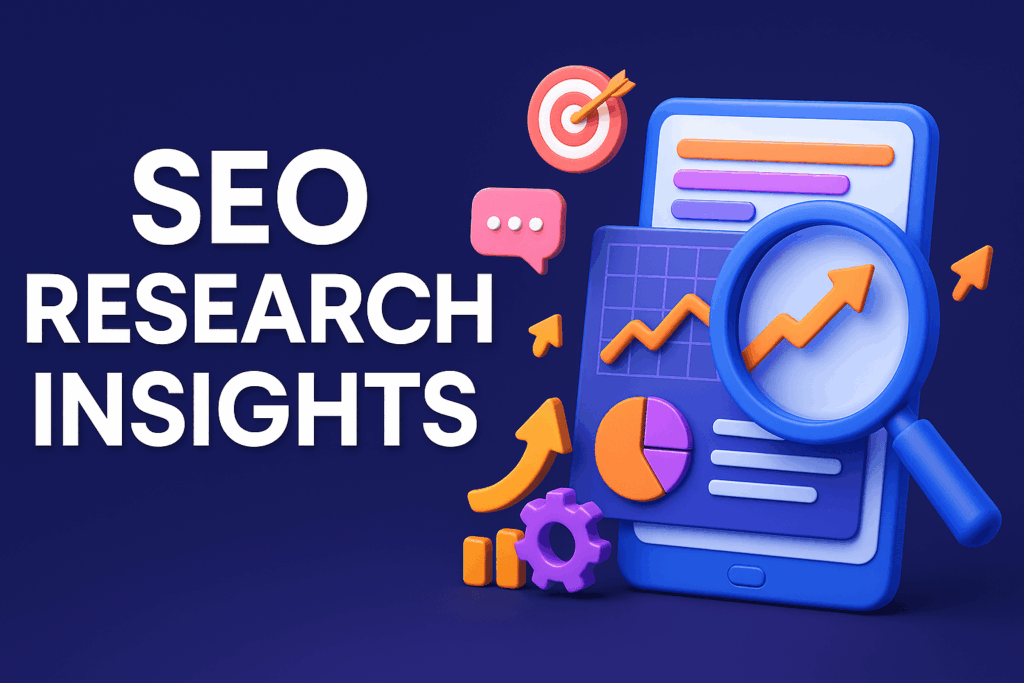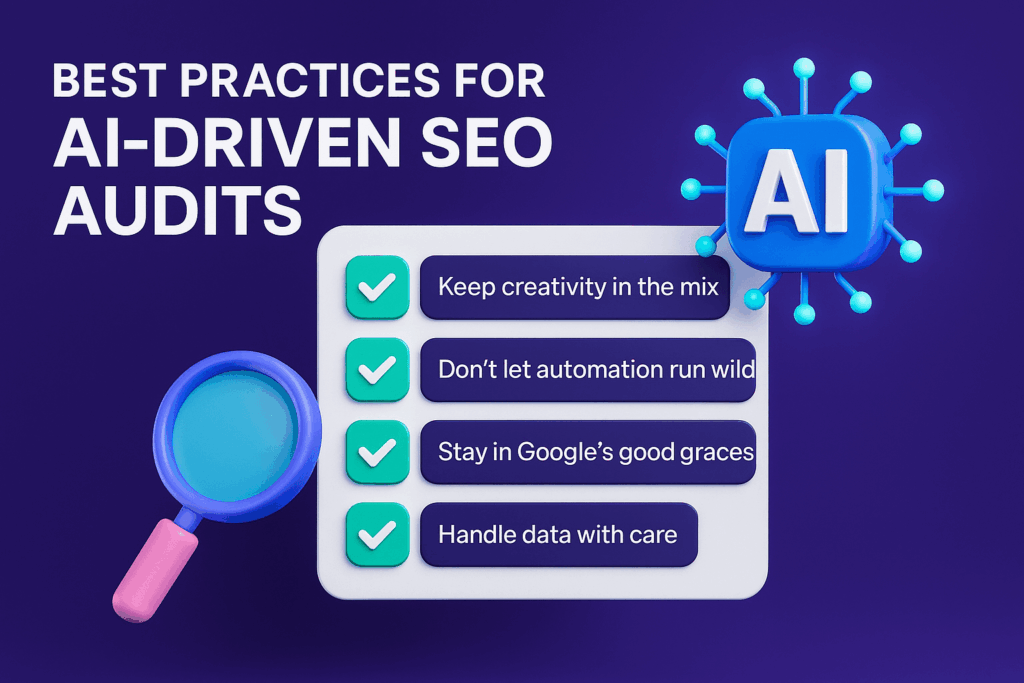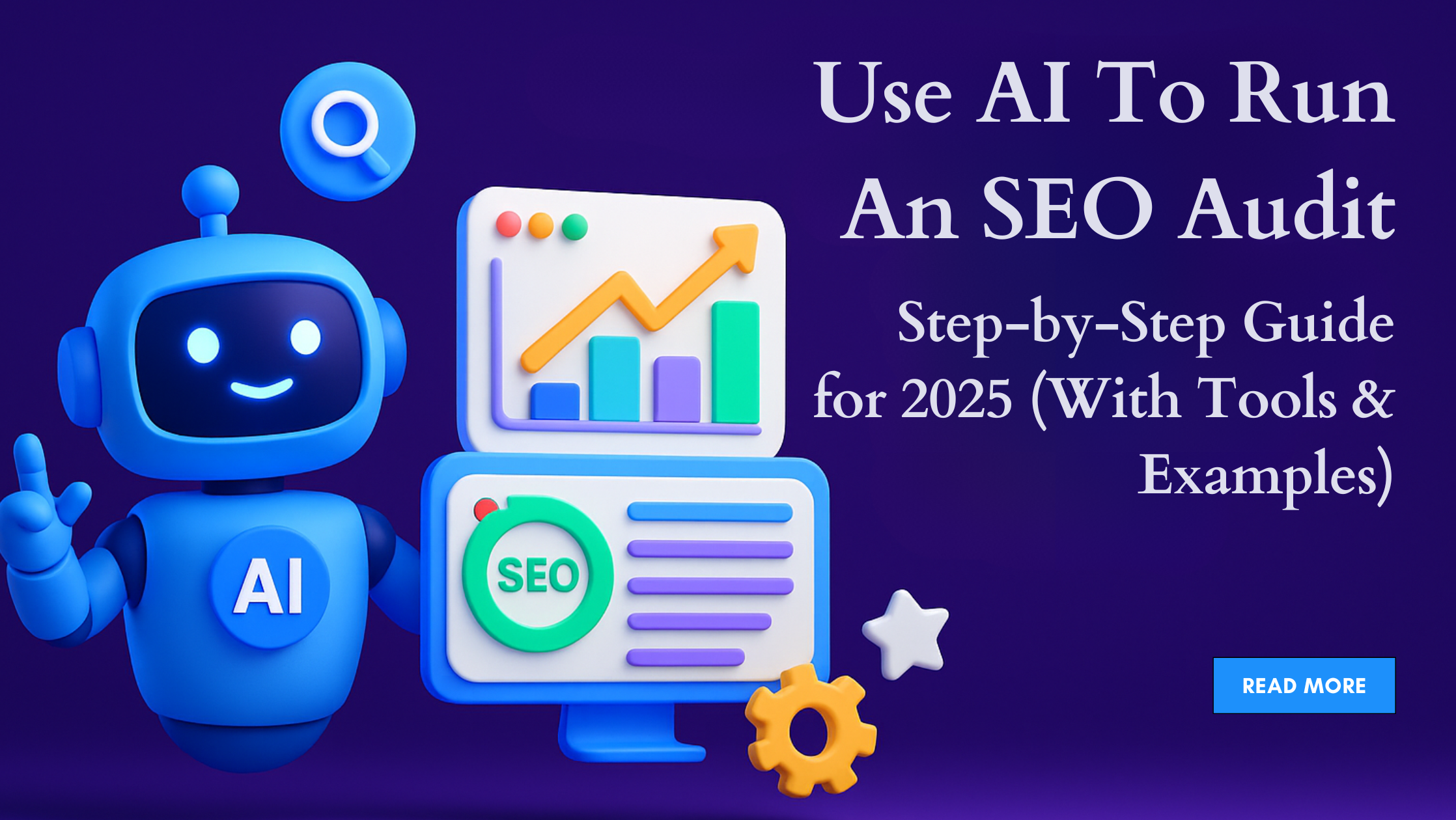In the ever-evolving world of search engine optimization (SEO), one truth remains: websites that aren’t regularly audited will struggle to rank. An SEO audit is like a health checkup for your site—it identifies what’s working, what’s not, and what can be improved. But as websites grow more complex, traditional SEO audits—often time-consuming and manually executed—simply can’t keep up.
Enters AI.
Artificial Intelligence is reshaping SEO audits in 2024–2025 by delivering faster, smarter, and more comprehensive insights. Tools like Surfer AI, NeuronWriter, SEMrush AI, Screaming Frog with ChatGPT plugin, and Alli AI use machine learning, NLP, and data modeling to analyze every aspect of your site—from keyword optimization to technical performance—in minutes.
In this blog, we’ll walk you through a step-by-step guide to using AI for SEO audits, complete with real-world use cases, practical examples, and the latest research trends that will keep your site ahead of Google’s evolving algorithms.
🧱 Why Traditional SEO Audits Fall Short: The Old Toolbox Just Doesn’t Cut It Anymore
Let’s face it—running a traditional SEO audit in 2025 is like trying to diagnose a Tesla using a wrench set from the ‘90s. While the fundamentals may still apply, the speed and complexity of modern websites have simply outgrown manual methods.
Here’s why the old-school approach is struggling to keep up:
⏳ 1. Manual Labor Overload — The Never-Ending Audit Spiral
Auditing a website manually means clicking through hundreds of URLs, digging through spreadsheets, checking metadata, crawling for broken links, and praying you didn’t miss anything. For a site with hundreds or thousands of pages (hello, e-commerce stores 👋), that’s not a task—it’s a multiday slog.
Imagine spending 14 hours fixing duplicate meta tags across 800 product pages—only to realize you forgot to check mobile usability. Painful, right?
🎲 2. Inconsistent Output — Different Auditor, Different Audit
SEO auditing isn’t standardized. One person might prioritize broken links; another might obsess over alt text. The result? Subjective recommendations, conflicting priorities, and a lack of repeatable processes.
No two manual audits are the same—and that’s not always a good thing when you’re aiming for data-driven decisions.
📏 3. Limited Scalability — Manual Just Doesn’t Multiply
As your site grows, so does the audit complexity. What works for a 20-page portfolio site breaks down completely when applied to a 5,000-page blog or Shopify store.
Traditional audits simply don’t scale. Even your best SEO expert can’t manually analyze each page’s performance, structure, and UX signals at scale—at least not within a reasonable timeframe.
❓ 4. Lack of Actionable Insights — Lots of Flags, No Fixes
Most legacy audit tools operate like red flag machines. They’ll tell you what’s broken, but not why it matters or how to fix it. That leaves you deciphering technical jargon, bouncing between tools, and guessing which issues actually impact rankings.
In other words: “You’ve got 47 issues” … Great, now what?
🤖 Enter AI: Not Just Faster, But Smarter
This is exactly where AI steps in as your digital audit sidekick—not just to speed things up, but to add clarity, context, and prioritization. It doesn’t just scream “error”—it tells you:
- Which errors affect rankings
- What to fix first for the most ROI
- How to fix them—with examples or code
AI doesn’t replace the SEO expert. It turns them into a strategic powerhouse, armed with insights that would take days to gather manually.
⚙️ Whether you’re managing a personal blog, scaling an e-commerce empire, or optimizing your agency’s client sites—traditional audits just can’t keep up with the complexity of the modern web. It’s time for a smarter approach.
🚀 How AI Transforms SEO Audits

AI isn’t just speeding up SEO audits—it’s reinventing the process from the ground up. From scanning your site to analyzing competitors, AI adds depth, intelligence, and real-time decision-making to every step of your SEO journey.
Let’s explore how AI upgrades the traditional audit into a smarter, faster, and more actionable process:
🔍 1. Crawling & Indexing Analysis — With Context, Not Just Code
Traditional SEO crawlers list errors like a to-do list with no explanations. But AI-powered tools like Screaming Frog (AI plugin) and Sitebulb AI don’t just say, “You’ve got 404s”—they tell you why those 404s matter.
- Got a page returning a soft 404? AI might flag it because the content is too thin.
- Dealing with endless redirect chains? AI explains how they’re wasting crawl budget and slowing down discovery.
✅ What makes this powerful? AI provides context and suggested fixes—so even non-tech teams can act on the data with confidence.
✍️ 2. Content Quality & NLP — Beyond Keywords, Into Meaning
Today, SEO is about relevance, depth, and clarity—and AI gets that. Tools like NeuronWriter and Surfer AI use Natural Language Processing (NLP) to analyze your content the way Google does.
They evaluate:
- 🧠 Readability: Is your content easy to understand?
- 📚 Semantic relevance: Are you covering the right topics in the right context?
- 🏆 Topical authority: Does your content actually deserve to rank?
These tools even benchmark your blog or product page against top-ranking competitors and highlight what you’re missing—whether it’s related subtopics, tone, or even content length.
🛠️ Tip: You can instantly see a “content score” and get a live checklist to optimize your page in real-time.
⚙️ 3. Technical SEO with AI — From Cryptic Code to Clear Fixes
Most technical audits leave marketers scratching their heads. Enter AI.
With tools like Google PageSpeed Insights enhanced by AI, you get more than a number—you get smart, easy-to-follow advice. AI now helps identify and explain:
- 🚫 LCP (Largest Contentful Paint) issues slowing down your site
- 📦 CLS (Cumulative Layout Shift) that causes page elements to jump around
- 🧩 Render-blocking JavaScript that delays content from loading
✅ Instead of handing over a confusing report to your dev team, you get prioritized fixes—complete with why they matter and how to implement them.
🥊 4. Competitor Analysis — Spy Like a Pro
Want to know why your competitor is ranking higher than you? AI-driven tools like Outranking and SpyFu decode their strategies for you.
They analyze:
- 🧱 Content structure: How their blogs are laid out, what topics they include
- 🔗 Backlink sources: Where their authority is coming from
- 📈 Keyword density: How often and how naturally keywords appear
🚀 Use this insight to build a smarter content plan, plug keyword gaps, and earn more traffic with less guesswork.
🧩 5. SERP Feature Optimization — Win the Snippet Game
Featured snippets. FAQs. People Also Ask. These rich SERP features are gold mines for visibility—and AI helps you win them.
By analyzing existing search results and your own content, AI tools identify:
- Which pages can be turned into snippet magnets
- What schema markup you’re missing
- Where to add question-based headings and direct answers
🧠 Example: If you’re writing a how-to guide, AI will suggest adding step-by-step formatting, bullets, and a summary box to increase your chances of landing the “How-To” snippet.
🧾 6. Structured Data Audit — Making Your Site Machine-Readable
Structured data helps search engines understand your content better—and AI makes implementing it easy.
Tools like Alli AI or Merkle Schema Tester scan your site for existing markup and flag what’s missing. Whether it’s:
- 🛍️ Product Schema
- 📄 Article Schema
- ❓ FAQ or How-To Schema
AI doesn’t just tell you what’s broken, it generates the correct JSON-LD code you can copy and paste into your CMS.
✅ Bonus: Some AI tools can auto-apply schema at scale for WordPress or Shopify sites, saving hours of manual work.
🧠 Final Thoughts
AI takes SEO audits from reactive checklists to strategic roadmaps. Instead of drowning in data and guessing what to fix, you get real insights, clear priorities, and fast implementation. Whether you’re running a personal blog, managing an online store, or helping clients grow traffic, AI helps you move smarter—not just faster. errors to improve rich result eligibility.
🛠️ Step-by-Step Process: AI-Powered SEO Audit (With Real-World Examples)
Ready to run your first AI-powered SEO audit? Great! Here’s a simple, action-based guide that walks you through every stage, using smart tools, real prompts, and automation that saves time without sacrificing strategy.
Let’s break it down:
✅ Step 1: Choose the Right AI SEO Audit Tool for the Job
Think of AI tools like a digital toolbox; each one is designed to fix or improve something specific. Here are the top performers in 2025:
- Surfer AI: Your go-to for content scoring, SERP gap analysis, and internal linking optimization. Perfect for writers, bloggers, and SEO strategists.
- NeuronWriter: Focuses on semantic content optimization using NLP. It helps you improve topic coverage, tone, and relevance.
- Screaming Frog + ChatGPT Plugin: The king of crawling. It scans your entire site and uses GPT to explain the issues in plain English.
- Alli AI: Ideal for technical SEO fixes—like adding schema markup, improving internal links, and automating site-wide changes.
- Outranking: Best for competitor-focused planning. It reverse-engineers top-ranking pages to help you craft smarter content strategies.
🧠 Pro Tip: Pick 2–3 tools based on your goals (content vs technical vs SERP). You don’t need to use them all at once.
🕵️ Step 2: Crawl Your Website and Extract Technical Data
Start with a full site crawl using Screaming Frog. Once done, plug the raw data into ChatGPT using a prompt like:
“Interpret this crawl: 47 404 errors, 13 redirect loops, 120 duplicate meta tags. Recommend prioritized fixes based on SEO impact.”
AI will respond with:
- Which issues are most critical
- Why they matter for rankings
- How to fix them (sometimes even with suggested code or meta tag rewrites)
You’ve just saved hours of manual analysis.
📝 Step 3: Audit On-Page SEO Using NLP-Powered Models
Use GPT-4 or Claude to scan individual blog posts or service pages. Try this prompt:
“Audit this URL for SEO: https://yoursite.com/blog-post. Suggest improvements to title, headings, keyword usage, and meta descriptions.”
Expect outputs like:
- Suggested H1/H2 structure
- Optimized meta descriptions
- Keyword frequency balance
- Content clarity improvements
Now you’ve got a blueprint to boost relevance without keyword stuffing.
📚 Step 4: Check Content Depth & E-E-A-T Signals
Open NeuronWriter or Surfer AI and run a content audit. The tool scores your article against the competition and flags what’s missing.
AI might say:
“Your blog lacks personal insights and expert attribution. Add a real-world example and include an author bio to boost trust.”
E-E-A-T (Experience, Expertise, Authority, and Trust) is now a major ranking factor. This step ensures your content doesn’t just read well—it ranks well.
🚀 Step 5: Review Core Web Vitals & Performance
Core Web Vitals = how fast, smooth, and stable your website feels to users. Run a Lighthouse or PageSpeed Insights report, then prompt ChatGPT:
“Summarize the key performance issues in this report and list the top 5 fixes.”
Likely AI suggestions:
- Convert images to WebP format
- Minify unused CSS and JavaScript
- Implement lazy loading for faster rendering
Even if you’re not a developer, AI makes these reports easier to understand—and easier to hand off to your tech team.
🔗 Step 6: Strengthen Internal Linking (Smartly)
Use Alli AI or LinkWhisper to audit your internal linking structure. These tools will help you:
- Identify orphan pages (pages with no incoming links)
- Suggest contextual link placements within existing content
- Improve anchor text variety for SEO relevance
🚦 Why it matters: Good internal linking helps Google crawl your site better and keeps users engaged longer—both win-win outcomes for SEO.
🥇 Step 7: Benchmark Against Competitors (The Secret Sauce)
Want to outrank someone? You need to know why they’re ahead.
Use Surfer’s SERP Analyzer or Outranking to:
- Compare your page to the top 3 Google results
- See what formats, word counts, and keywords they’re using
- Identify missing features like FAQs, lists, or case studies
Example insight:
“Top-ranking pages for ‘AI SEO audit’ include step-by-step guides and real-life examples. Add a ‘Before vs After’ case study to match user intent.”
Use these insights to level up—not guess.
📊 Step 8: Generate a Branded, Shareable Audit Report
Finally, make all this work look good and easy to act on. Use GPT-4 or a visual AI tool like Beautiful.ai or Canva AI to generate a branded report.
Prompt:
“Create a visual SEO audit summary with 10 technical issues, 5 content opportunities, and 3 competitor insights for https://yourwebsite.com.”
Use this report to:
- Guide your internal SEO team
- Impress clients or stakeholders
- Create a content roadmap for the next 30–90 days
2024–2025 SEO Research Insights

🔍 Google’s SGE (Search Generative Experience)
With AI-generated answers appearing at the top of Google results, optimizing for Answer Engine Optimization (AEO) and Generative Engine Optimization (GEO) is critical.
SEO Tip: Use AI to rewrite your FAQ, add How-To schema, and match Google’s answer formatting to appear in these snippets.
🧠 E-E-A-T is Stronger Than Ever: Google’s Trust Thermometer Just Got Smarter
In 2025, Google isn’t just ranking websites—it’s evaluating your reputation.
With the latest updates to its E-E-A-T framework (Experience, Expertise, Authoritativeness, and Trustworthiness), Google is raising the bar for what counts as high-quality content. It’s no longer just about stuffing keywords or writing grammatically correct articles. It’s about proving your content comes from real people with real knowledge, backed by real-world results.
So what does this mean for your website?
📌 1. Experience Is the New King
Google now actively favors content that reflects lived, first-hand experience. Whether you’re writing a product review, a how-to guide, or a case study—you need to show that you’ve been there, done that.
✅ Example: “I used Surfer AI to optimize my homepage and saw a 38% increase in CTR within 14 days.”
❌ Not enough: “Surfer AI is a good tool for SEO.”
Your audit should flag content that lacks this layer of credibility—and suggest places where experience-based insights can be added.
📌 2. Author Credibility Is a Ranking Factor
Anonymous blog posts are getting pushed aside. Google now crawls for author bios, LinkedIn profiles, and even published credentials. AI tools like Surfer and Outranking can assess if your articles have visible authorship and whether your author matches topical relevance.
✍️ Add an author bio that highlights your qualifications, years of experience, or notable work. Link to your social profiles or external contributions.
📌 3. Cite Like a Scholar, Rank Like a Pro
Source quality matters more than ever. Are you linking to verified data? Are your claims supported by recognized industry resources?
AI can now audit external links to determine:
- Authority of the source domain
- Recency of the information
- Topical alignment with your content
If your page references a 2017 blog on SEO trends, consider it outdated. Smart AI tools will recommend fresher, more relevant replacements (like the latest Google Search Central insights).
📌 4. Real-World Usage Data Matters
Case studies, user-generated content, testimonials, and screenshots now contribute heavily to your perceived trust level. During an audit, AI tools can flag:
- Lack of visuals or proof
- No testimonials or social proof
- No schema markup for reviews or FAQs
🤖 How AI Powers E-E-A-T Optimization
The good news? You don’t need to comb through hundreds of articles manually. Tools like NeuronWriter, Surfer AI, and GPT-based LLMs can now evaluate E-E-A-T at scale by:
- Analyzing tone and author references
- Scanning for data citations
- Suggesting content enrichment for authority
Imagine getting a report that says:
“Article X lacks firsthand experience and links to outdated sources. Add a quote from a subject matter expert and replace links with Google’s 2024 SEO Guidelines.”
That’s the level of insight AI delivers today.
🔎 Bottom line: If your content doesn’t look credible to humans, it won’t look credible to Google either. And now, with AI helping Google get even better at recognizing trust signals, it’s time to audit your expertise footprint—before your rankings fade into digital oblivion.
Let me know if you’d like to pair this section with a visual checklist or infographic for E-E-A-T optimization!
✅ Best Practices for AI-Driven SEO Audits: Keep It Smart, Not Robotic

Using AI to audit your website for SEO is like giving your marketing team superpowers. But just like any superhero, with great power comes great responsibility. ⚡️
AI can scan thousands of data points, spot patterns, and even suggest content—but if you blindly follow it without human oversight, you might end up optimizing yourself out of the rankings. Here’s how to use AI wisely, like a seasoned digital strategist (not a reckless robot).
🔍 1. Validate AI Suggestions — Because Robots Don’t Know Your Brand Voice
Sure, GPT can rewrite your meta descriptions and header tags in seconds. But does it sound like your brand? Does it reflect your tone—be it quirky, formal, technical, or casual?
Pro tip: Treat AI as your editor, not your author. Always do a final read-through and ask, “Would my audience resonate with this?”
🧠 2. Avoid Over-Automation — Creativity Still Wins the SERP
AI can crank out 10 blog posts in a day, but quantity ≠ quality. Google’s algorithms are now smart enough to detect thin, AI-generated fluff—and they’re not fans.
Remember: Great SEO isn’t just about keywords—it’s about insight, storytelling, and originality. Let AI handle the grunt work, but leave the spark of creativity to you (or your trusted content team).
📏 3. Respect Google’s House Rules — Don’t Game the System
It might be tempting to auto-inject schema everywhere or stuff “best AI SEO audit tool 2025” into every paragraph—but Google’s not falling for that anymore.
Misleading markup or keyword stuffing may bring short-term clicks, but long-term penalties. Trust us, recovering from an algorithm slap is no fun.
Stick to ethical SEO practices. Use AI to enhance—not exploit—the rules of the game.
🔐 4. Handle Data with Care — Privacy Isn’t Optional
When you’re auditing client websites or sensitive dashboards, think twice before feeding that data into open AI tools. Many free platforms store or log inputs.
Best practice: Mask sensitive info or use enterprise-grade AI tools with proper data security policies. Respecting privacy isn’t just about compliance—it’s about trust.
💡 Bonus: Human + AI = The Real SEO Dream Team
The future isn’t AI vs. humans—it’s AI with humans. AI brings speed, scale, and structure. You bring judgment, creativity, and strategy.
When used responsibly, AI doesn’t replace your SEO instincts—it amplifies them.
✨ Wrap-up: Use AI like your digital co-pilot—always helpful, but you’re still the one flying the plane. With the right balance of automation and authenticity, your SEO audits will be smarter, safer, and a whole lot more successful.
Conclusion
AI is not just a convenience—it’s a necessity for modern SEO audits. From technical issues to content optimization and SERP strategy, AI tools deliver deeper insights and faster fixes. Whether you’re a blogger, small business owner, or freelance SEO expert, AI makes your audit process scalable, efficient, and results-driven.
🟢 Want to boost your rankings the smart way?
Hire vetted freelance SEO professionals on Truelancer and let them implement your AI-driven audit today.
🧠 Looking to DIY your SEO audit?
Start with tools like Surfer AI, NeuronWriter, and Screaming Frog AI plugin—they’re beginner-friendly and powerful enough for pros.






